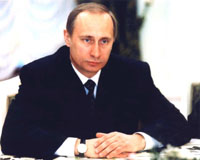U.N. report reflects progress in clarifying Iran's nuclear activities

Tehran must continue its cooperation with the U.N. nuclear watchdog, Russia said Monday, noticing that the last U.N. report reflected some progress in clarifying Iran's nuclear activities.
Moscow's relatively neutral response to last week's International Atomic Energy Agency report contrasted with stronger calls by the United States for a new round of U.N. sanctions to press Tehran to stop uranium enrichment.
Washington and several European countries say Iran's efforts are part of a covert nuclear weapons program; Tehran insists it needs uranium enrichment only for energy purposes.
The IAEA's report concluded that Iran had been generally truthful about key aspects of its nuclear history. But it said it still could not rule out that Iran had a secret weapons program because of the restrictions Tehran slapped on inspectors two years ago.
The report also stressed that Tehran continues to defy Security Council resolutions by ignoring its repeated demands to freeze uranium enrichment - a potential pathway to nuclear arms.
Foreign Ministry spokesman Mikhail Kamynin said that the IAEA's report marked a move forward in answering questions, but said that the agency should continue its probe.
"It's not a final positive diagnosis yet," he said in a statement. "The IAEA still can't confirm the absence of undeclared nuclear activities in Iran. To achieve that, Iran still has to do lot in cooperation with the agency."
Two rounds of limited U.N. sanctions have failed to persuade Iran to halt enrichment, a technology that can be used to produce nuclear fuel to generate electricity or fissile material for a warhead.
Russia, which is building Iran's first nuclear power plant, has grudgingly supported the previous rounds of sanctions against Iran, but opposed tougher measures, warning they would only exacerbate the crisis.
President Vladimir Putin, who visited Tehran last month, said there was no proof that Iran was seeking nuclear weapons.
Subscribe to Pravda.Ru Telegram channel, Facebook, RSS!




